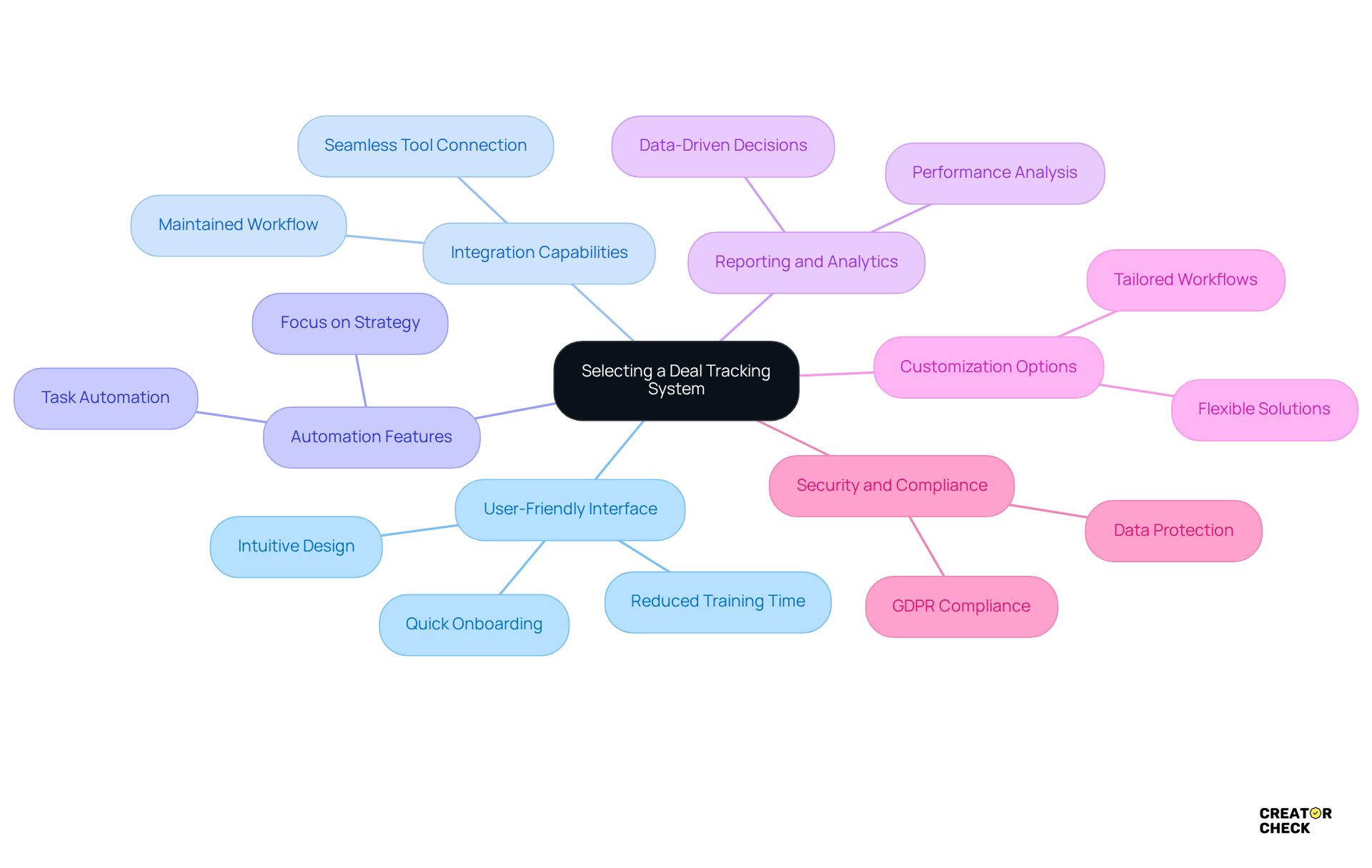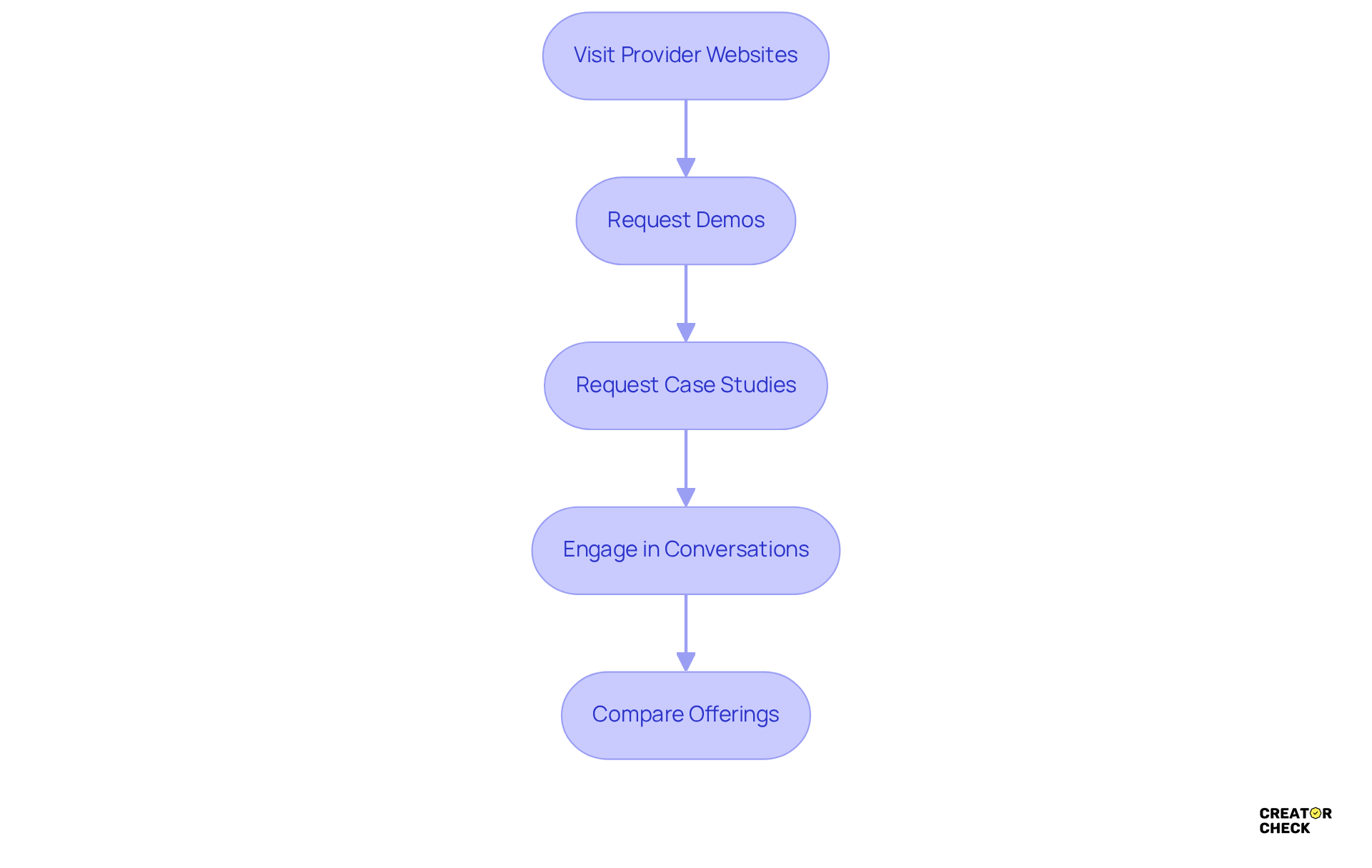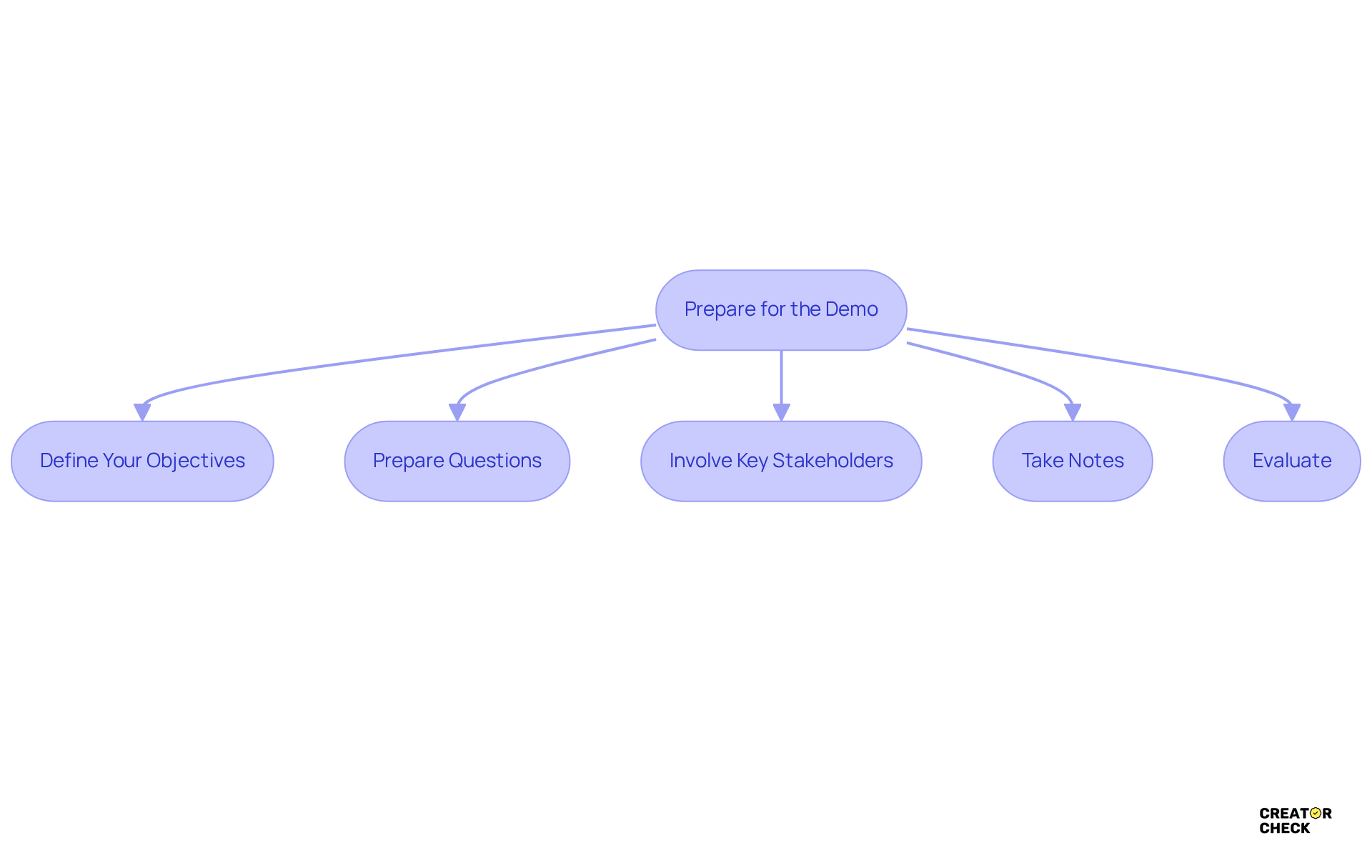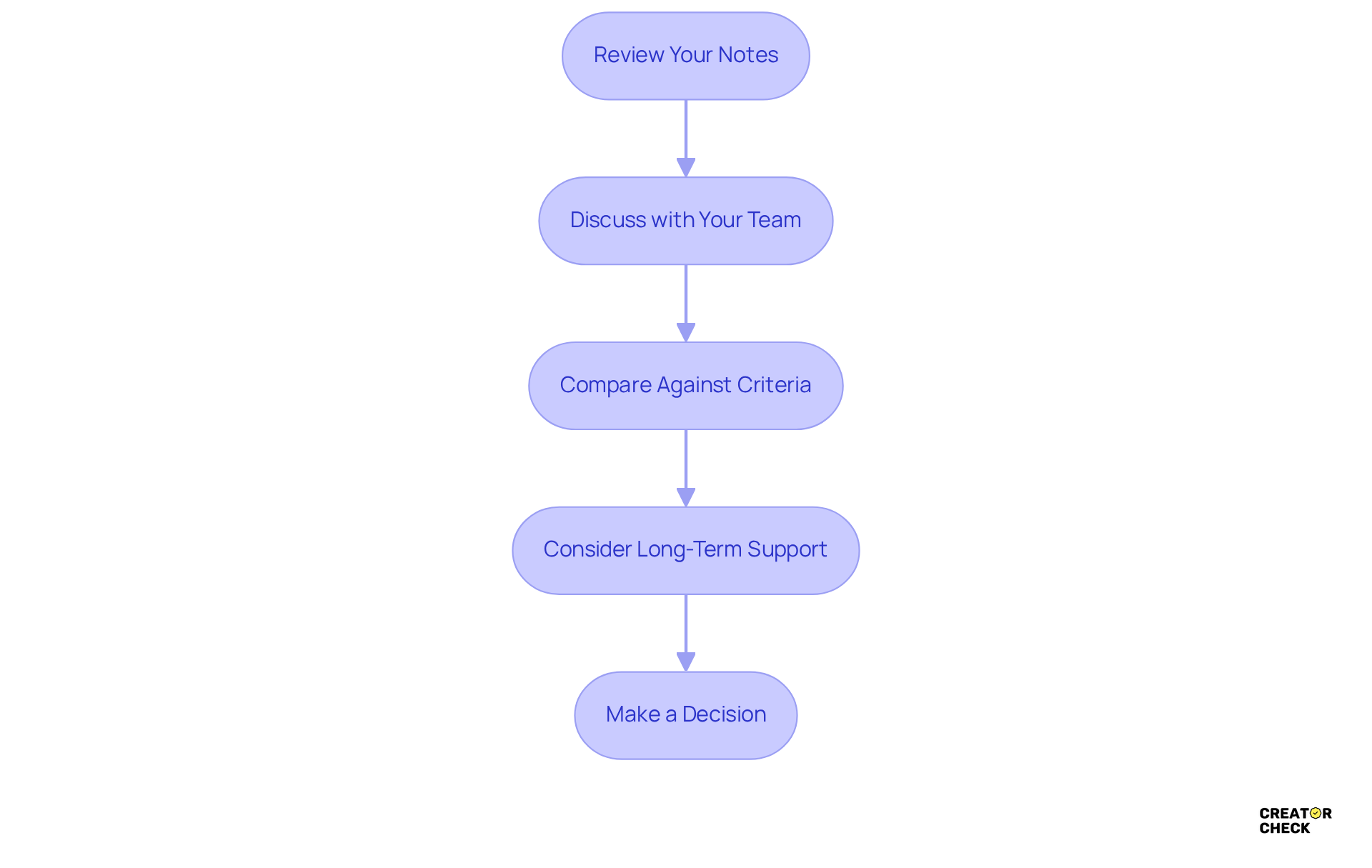Overview
This article walks you through a five-step process for booking a demo of a deal tracking system specifically designed for influencer agencies that manage brand campaigns.
Why is this important? Well, these systems can really boost your operational efficiency, automate those tedious tasks, and help you make data-driven decisions.
In the end, this means better management of your brand collaborations and the potential for increased revenue. Sounds good, right?
Introduction
Navigating the complex world of influencer marketing can be a bit tricky, right? It really calls for precision and efficiency, especially when you're managing brand campaigns. That’s where a deal tracking system can come in handy—it’s a total game-changer for agencies! By centralizing collaboration efforts and automating those critical tasks, it can really boost productivity. But with so many options out there, how do you choose the right system that not only meets your needs but also helps you succeed?
This guide is here to walk you through five essential steps to booking a demo of a deal tracking system. Let’s empower your influencer agency to make informed decisions that can significantly enhance your operational efficiency and strengthen client relationships!
Understand the Importance of a Deal Tracking System for Influencer Agencies
It is essential for influencer firms to book a demo of a deal tracking system for influencer agencies managing brand campaigns. It centralizes how you manage brand collaborations, allowing you to book a demo of the deal tracking system for influencer agencies managing brand campaigns and making it easier to keep track of ongoing agreements. By automating tasks like tracking negotiations, monitoring progress, and managing communications, you can save a ton of time and resources, so be sure to book a demo of the deal tracking system for influencer agencies managing brand campaigns. This setup not only boosts your operational efficiency but also helps you make data-informed choices that can lead to higher revenue.
For example, by looking back at previous agreements, you can spot patterns and improve your future negotiations, ensuring that creators get the best compensation for their hard work. Plus, you can book a demo of the deal tracking system for influencer agencies managing brand campaigns to ensure you stick to industry standards and foster better client relationships through clear reporting on campaign performance.
Did you know that 75% of marketers say automation lets them focus more on strategic planning? Adopting tools like this can really change the game for influencer firms looking to thrive in a competitive landscape, especially when they book a demo of a deal tracking system for influencer agencies managing brand campaigns. So, what does this mean for you? It’s time to consider how a partnership monitoring platform can be your ally in achieving success!
![]()
Identify Key Features and Criteria for Selecting a Deal Tracking System
When selecting a deal tracking system, influencer agencies should keep a few key features in mind to boost operational efficiency and make it easier for users to get on board:
-
User-Friendly Interface: An intuitive and easy-to-navigate platform is a must! Did you know that 94% of first impressions are tied to design? A user-friendly interface helps your team adapt quickly without needing extensive training, which cuts down onboarding time and ramps up productivity.
-
Integration Capabilities: Look for a platform that connects seamlessly with your existing tools, like CRM solutions and communication apps. This way, you can maintain a smooth workflow and minimize disruptions in your daily operations.
-
Automation Features: It's a good idea to seek out systems that offer automation functionalities to take care of repetitive tasks, such as email follow-ups and transaction status updates. Automation can save your organization a ton of time, allowing you to focus on strategic initiatives instead of mundane tasks.
-
Reporting and Analytics: Robust reporting features are essential for analyzing deal performance and tracking key metrics. With these insights, agencies can make data-driven decisions that enhance their effectiveness in managing brand campaigns.
-
Customization Options: A customizable platform can be tailored to fit your organization’s unique workflows, ensuring it meets your specific operational needs. This flexibility is vital, especially for organizations managing multiple creators and campaigns, as it allows for customized solutions that boost productivity.
-
Security and Compliance: Given the sensitive nature of influencer contracts and negotiations, it’s crucial that the system complies with data protection regulations and ensures secure data handling. Creator Check emphasizes data security through enterprise-grade encryption and adherence to GDPR standards, which is key for maintaining trust and protecting your organization’s reputation. Plus, features like the Brand Book and the ability to manage multiple inboxes enhance operations, helping you effectively manage various creator communications.
By focusing on these criteria, agencies can book a demo of the deal tracking system for influencer agencies managing brand campaigns, which not only meets their current needs but also adapts as they grow, ultimately improving operational efficiency and boosting revenue generation.

Research and Contact Deal Tracking System Providers
To effectively research and reach out to deal tracking providers, start by crafting a list of potential candidates. You can tap into online resources, industry reviews, and peer recommendations within the influencer marketing space. Here’s how to streamline your process:
- Visit Provider Websites: Take a look at the features, pricing, and customer testimonials available on their websites. This will help you gauge what they offer.
- Request Demos: Most providers are happy to set up demo requests. Just fill out the necessary forms to book a demo of the deal tracking system for influencer agencies managing brand campaigns, so you can see the setup in action.
- Request Case Studies: Look for case studies or success stories from other influencer firms that have used their approach. This info can provide valuable insights into how effective the framework is and how it can be applied practically.
- Engage in Conversations: Connect with sales representatives to chat about your organization’s specific needs. Don't hesitate to ask detailed questions about the platform's capabilities and how it can address your unique challenges.
- Compare Offerings: Create a comparison chart to evaluate the features, pricing, and support options of each provider. This organized method will help you make a well-informed choice based on what your organization needs.
By following these steps, you can ensure that you pick a solution for tracking agreements that aligns with your agency's goals and boosts your operational efficiency.

Prepare for the Demo: Questions and Objectives to Consider
Before you jump into the demo, it’s super important to outline your objectives and whip up a list of questions. This way, you can cover all the necessary aspects effectively. Here are some key things to think about:
-
Define Your Objectives: What do you want to achieve with the arrangement monitoring tool? Are you aiming to boost efficiency, enhance your reporting, or streamline communication? Research shows that organizations with clear goals are 31% more likely to hit their targets, so this step is pretty crucial.
-
Prepare Questions: Make a solid list of questions to ask during the demo, like:
- How does the system handle deal tracking and reporting?
- Can you show off the automation features?
- What support options are available after implementation?
- How does the framework ensure data security, especially with enterprise-grade encryption and compliance with GDPR and other data protection standards?
- Can Creator Check manage multiple inboxes from different providers?
-
Involve Key Stakeholders: Don’t forget to bring along team members who will actually use the platform during the demo. Their input is super valuable, as they can ask relevant questions and share insights from their experiences.
-
Take Notes: Jot down key points during the demo, including standout features and any concerns that pop up. This will help you evaluate everything later and make a more informed decision.
By following these steps, you can make your demo experience way more efficient and ensure that the management platform fits your organization’s needs perfectly.

Evaluate the Demo Experience and Make an Informed Decision
After you book a demo of the deal tracking system for influencer agencies managing brand campaigns, it's super important to take a moment and really assess how the solution stacks up against your organization's needs. Here’s a friendly guide to help you through a thorough evaluation:
- Review Your Notes: Take a good look at the notes you jotted down during the demo. What key features stood out that align with your organization's goals?
- Discuss with Your Team: Why not gather your team for a chat? Share your thoughts about the demo, collect feedback, and tackle any concerns together. This collaborative vibe is crucial—after all, did you know that 37% of companies don’t have a clearly defined customer success strategy?
- Compare Against Criteria: Go back to the criteria you set before the demo and see how well the solution meets each one. This structured comparison is key for making informed decisions, especially when juggling multiple creators and campaigns, as it can help you book a demo of the deal tracking system for influencer agencies managing brand campaigns.
- Consider Long-Term Support: Think about the vendor’s support options. Are there ongoing training and assistance available? A solid support network can really boost your organization’s efficiency. In fact, 88% of Customer Success Platform users say they spend more time on meaningful customer engagements thanks to good support.
- Make a Decision: Now that you’ve done your evaluation, it’s time to decide whether to stick with this provider or look elsewhere. Make sure your choice aligns with your agency's goals and boosts your operational efficiency. Remember, effective decision-making can lead to better outcomes in managing your brand campaigns!

Conclusion
Booking a demo of a deal tracking system is a key move for influencer agencies looking to streamline their brand campaign management. By centralizing operations, automating tasks, and offering valuable insights, these systems help agencies boost efficiency and build stronger client relationships. The right deal tracking system not only makes managing agreements easier but also empowers agencies to make data-driven decisions that can really ramp up revenue.
So, what’s next? This guide has laid out some essential steps, from grasping the importance of a deal tracking system to making the most of your demo experience. Key features like user-friendly interfaces, integration capabilities, automation, and solid reporting are highlighted as must-haves when choosing the right platform. Plus, don’t forget the importance of thorough research and preparation for demos—this ensures you can make informed choices that align with your operational goals.
In conclusion, embracing a deal tracking system isn’t just about refining current processes; it’s about paving the way for long-term success in the competitive influencer marketing scene. Agencies are encouraged to take proactive steps in researching providers, prepping for demos, and carefully weighing their options. By doing this, you can unlock the full potential of your operations, leading to more successful brand campaigns and stronger partnerships.
Frequently Asked Questions
Why is a deal tracking system important for influencer agencies?
A deal tracking system is essential for influencer agencies as it centralizes the management of brand collaborations, automates tasks like tracking negotiations and monitoring progress, and helps save time and resources. It also enables data-informed decision-making that can lead to higher revenue.
What benefits can agencies gain from using a deal tracking system?
Agencies can improve operational efficiency, spot patterns in previous agreements for better future negotiations, ensure adherence to industry standards, and foster better client relationships through clear reporting on campaign performance.
What are some key features to look for in a deal tracking system?
Key features include a user-friendly interface, integration capabilities with existing tools, automation features for repetitive tasks, robust reporting and analytics, customization options, and strong security and compliance measures.
How does a user-friendly interface impact the effectiveness of a deal tracking system?
A user-friendly interface allows team members to adapt quickly without extensive training, reducing onboarding time and increasing productivity.
Why are integration capabilities important in a deal tracking system?
Integration capabilities are important because they allow the deal tracking system to connect seamlessly with existing tools, like CRM solutions and communication apps, maintaining a smooth workflow and minimizing disruptions.
How does automation benefit influencer agencies using a deal tracking system?
Automation helps agencies handle repetitive tasks, such as email follow-ups and transaction status updates, saving time and allowing teams to focus on strategic initiatives instead of mundane tasks.
What role do reporting and analytics play in a deal tracking system?
Reporting and analytics are essential for analyzing deal performance and tracking key metrics, enabling agencies to make data-driven decisions that enhance their effectiveness in managing brand campaigns.
Why is customization important for a deal tracking system?
Customization is important because it allows the platform to be tailored to fit an organization’s unique workflows, ensuring it meets specific operational needs, especially for agencies managing multiple creators and campaigns.
What security measures should a deal tracking system have?
A deal tracking system should comply with data protection regulations, ensure secure data handling, and incorporate features like enterprise-grade encryption and adherence to GDPR standards to maintain trust and protect the organization's reputation.




